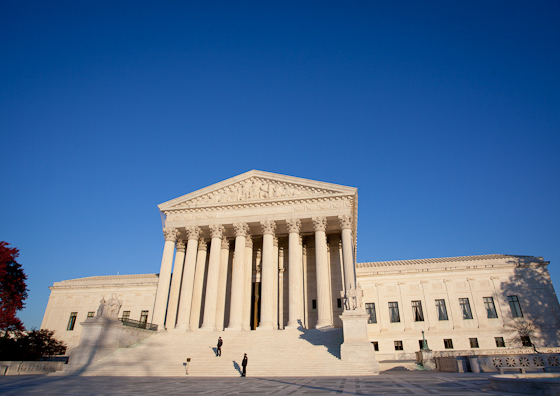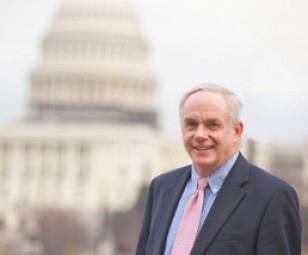Supreme Court Ruling Could Impact Election

Arguments are underway in the U.S. Supreme Court, above, over the Obama administration's key health care law. Photo: Alison Klein, VOA
This week marks one of those rare instances where what happens at the U.S. Supreme Court could have an impact on the presidential election results in November. The battle over the Obama health care law has pretty much defined the first three years of the president’s administration. It also gave rise to the Tea Party conservative movement that proved influential in the 2010 congressional elections, helping Republicans retake control of the House of Representatives and picking up seats in the Senate.
The high court will rule on the constitutionality of the health care law sometime before the end of June. And while the state of the domestic economy will be the biggest factor in this year’s election, whichever way the court rules on health care could motivate one side or the other, or both for that matter.
Tuesday’s oral arguments at the court dealt with the most controversial aspect of the law, the so-called individual mandate that by 2014 would require all Americans to buy some form of health insurance. Supporters say the mandate is crucial to cover the costs of people who get health care treatment but don’t buy insurance. Critics say it is an unconstitutional power-grab by the central government.
The tenor of Tuesday’s arguments indicated that the four conservatives on the high court plus swing Justice Anthony Kennedy were skeptical of the constitutionality of the individual mandate. The four justices appointed by Democratic presidents seemed more supportive of the law.

President Obama, returning from a trip to Asia, has a lot at stake in the Supreme Court case. Photo: AP
A decision by the court to strike down the health care law would be seen as vindication by Republicans, Tea Party activists and libertarian thinkers who want to limit the power of the central government. But it could also serve to anger supporters of the health care law, who focus on its benefits, and could help get them out to vote in November for President Obama.
On the other hand, a ruling that upholds the law would be a major source of frustration to opponents and could whip up support among anti-Obama activists and help the Republican presidential nominee, which at this point likely will be Mitt Romney. If the law is upheld, opponents will see replacing Obama as the only way to ensure that the law is repealed and it could spark renewed energy, not only for the Republican presidential nominee, but for Republican congressional candidates as well.
Health care reform has long been a major fault line in U.S. politics. Bill Clinton made health care reform a major cause of his administration in the early 1990s and put then-First Lady Hillary Clinton in charge of the effort.
That, as we remember, didn’t work out too well for the Democrats. The program was seen by many as over-reaching and voters punished Democrats at the polls in the 1994 midterm congressional elections, electing Republican majorities in both the House and Senate for the first time in 40 years.
So the election results in 2012 will tell us a lot about whether the country is in a different place now on the issue of health care than where it was 18 years ago.
Santorum Struggling to Hang on
It was a bit of an up and down week for Rick Santorum — a big win in the Louisiana primary followed by a meltdown in an exchange with a reporter from the New York Times. Santorum let loose after he felt he’d been taken out of context when he said Mitt Romney was the worst Republican in the country to challenge President Obama over health care, given Romney’s history with a similar law in Massachusetts. But the exchange on Santorum’s end was short on substance and heavy on indignation and it seemed to tell the story of a candidate growing increasingly frustrated that he can’t cut into Romney’s lead in the delegate count.

Rick Santorum speaks in front of Supreme Court as it considers the Obama administration health care law. Photo: AP
Santorum’s win in Louisiana showed that evangelical Christians and conservative activists still have problems making the switch over to Romney. But in the end, Santorum picked up little ground on Romney in the delegate totals. The latest Associated Press tally puts Romney at 568 and Santorum at 273.
Romney is well on his way to the 1,144 number he needs to secure the party nomination, but he probably won’t get close to nailing down that total until sometime in June when big states like California and New Jersey weigh in.
It’s possible that frustration with the delegate math is taking a toll on Rick Santorum.
Here’s a guy who emerged from nowhere in the cornfields of Iowa to become Mitt Romney’s main challenger, only to come up short in the big primary showdowns in Michigan, Ohio and Illinois. For now he stays in the race, but each day Romney announces new Republican endorsements, including from some notable Tea Party types like Senator Mike Lee of Utah. It may take a while but Romney seems on a trajectory toward the Republican Party nomination and there seems to be no clear path for Santorum to change the dynamics of the race or the delegate math in any significant way.


4 responses to “Legal Showdown over Health Care”
We need Obamacare NOW ASAP!
Well, here we go. The need for health reform vs. the mandate. I for one who has been in the business quite sometime will be interested in where this goes.
[…] Voice of America (blog) […]
hello there and thank you for your information – I have definitely picked up something new here. Anyway I’m looking out for a lot more of your intriguing content….